
The intersection of artificial intelligence (AI) and the iGaming industry is catalyzing a transformative wave of innovation, fundamentally altering how players interact with online gaming platforms. Recent developments highlight a burgeoning market eager to merge AI’s predictive capabilities with blockchain’s transparency and novel profit-sharing models, fostering a new ecosystem that enhances user engagement and profitability. This convergence is reshaping the iGaming landscape, making it more dynamic, inclusive, and economically rewarding for participants.
AI Integration in iGaming: Enhancing Player Experience and Platform Efficiency
The adoption of AI technologies in iGaming platforms has evolved beyond basic automation and fraud detection, now playing a pivotal role in personalizing gaming experiences and optimizing platform efficiency. Platforms like Qzino and XGENIA are at the forefront of this evolution, leveraging AI to tailor gameplay, refine odds calculations, and enhance user retention through personalized content. Qzino, for instance, utilizes AI not only to improve game mechanics but also to revolutionize its economic structure by sharing 50% of platform revenues with token holders. This innovative approach transforms casual gamers into stakeholders, fostering a deeper sense of ownership and engagement within the ecosystem.
XGENIA, founded by industry veterans, exemplifies a similar commitment to AI-driven innovation. Its AI-powered platform targets both casino and sports betting verticals, offering predictive analytics and real-time decision support tools that elevate gameplay sophistication and fairness. By integrating AI, these platforms can analyze vast amounts of data to predict player behavior, optimize game outcomes, and provide personalized recommendations, thereby enhancing the overall gaming experience.
Profit Sharing Models: Redefining User Roles from Players to Participants
One of the most revolutionary aspects emerging in the iGaming industry is the shift towards profit-sharing frameworks. Qzino’s model is particularly noteworthy, as it distributes half of the platform’s revenues to token holders, directly linking financial incentives with user engagement. This approach motivates players to contribute to the platform’s growth and security, aligning their interests with those of the platform and fostering loyalty and sustained activity.
This profit-sharing model challenges traditional revenue structures where profits predominantly flow to the house. By sharing success, platforms cultivate vibrant communities that can influence governance, developmental direction, and marketing, creating a decentralized ecosystem fortified by user advocacy. This participatory model not only enhances user engagement but also ensures that the platform’s success is directly tied to the collective efforts of its community.
Blockchain and Cryptocurrency: Building Transparency and Trust
The integration of blockchain technology is a cornerstone of the innovations in the iGaming sector, providing transparency in profit distribution and game fairness. Crypto-casino platforms like Qzino rely on blockchain to securely manage token transactions and smart contract executions, automating profit-sharing processes and reducing administrative overhead. This transparency increases trustworthiness and ensures that all transactions are verifiable and tamper-proof.
Moreover, the adoption of cryptocurrencies enables seamless integration with popular digital assets such as Bitcoin, making platforms accessible to a global audience increasingly favoring digital currencies. The use of crypto also facilitates fast, low-cost cross-border payments and introduces anonymity and privacy protections that traditional casinos cannot match. This not only enhances the user experience but also attracts a broader demographic of tech-savvy players who value privacy and decentralization.
Emerging Market Strategies and Regional Innovations
Recent launches in the iGaming sector focus on regional targeting and creator-led markets, as seen with PredicXion’s AI-powered prediction market tailored for the Asia-Pacific region. These platforms leverage local insights while deploying AI to curate predictive outcomes and betting options that resonate culturally and economically with their user base. By understanding regional preferences and behaviors, these platforms can offer more relevant and engaging content, thereby increasing user satisfaction and retention.
Additionally, companies are expanding their footprints by developing multichannel deployments, such as mini-apps within Telegram environments. This strategy lowers entry barriers and enhances accessibility on familiar social platforms, accommodating the growing mobile user base and the increasing preference for micro-engagements. By integrating gaming experiences into popular social media platforms, these companies can reach a wider audience and foster a more interactive and community-driven gaming environment.
Challenges and Considerations
Despite the promising advancements, the integration of AI and profit-sharing in iGaming presents several challenges. Regulatory scrutiny is intensifying worldwide, with authorities focusing on fairness, anti-money laundering compliance, and responsible gaming safeguards. Platforms must navigate complex legal environments, continuously adapting AI tools to uphold ethical standards and player protections. Ensuring compliance with varying regional regulations is crucial for maintaining trust and avoiding legal pitfalls.
Additionally, balancing profit-sharing with platform sustainability is critical. While distributing revenue benefits users, platforms must ensure sufficient capital for development, marketing, and operational costs to maintain long-term viability. Striking the right balance between user rewards and platform sustainability is essential for long-term success.
Conclusion: A New Paradigm Shaping the Future of iGaming
The fusion of AI, blockchain, and innovative economic models signals a fundamental transformation in the iGaming industry. Platforms like Qzino and XGENIA showcase how AI can power adaptive gaming experiences while redefining players as active participants through profit-sharing. This enhances player engagement, drives growth, and fosters transparent, community-driven ecosystems.
Looking forward, these trends suggest a future where online gaming is not just entertainment but a collaborative, financially participative venture. Success will hinge on technological sophistication balanced with regulatory compliance and user trust. Those platforms able to master this blend are poised to lead the next generation of iGaming evolution, creating deeply immersive, equitable, and rewarding environments for players worldwide. As the industry continues to evolve, the integration of AI and profit-sharing models will likely become the norm, reshaping the iGaming landscape into a more inclusive and dynamic ecosystem.





